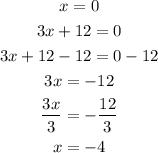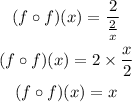Since the given functions are

To find f(g(x)), substitute x in f by g(x)

The domain is the values of x that make the function defined
The function is undefined if the denominator = 0
Then equate the denominators by 0 to find the values of x which make the denominator = 0

Then the domain is all values of x except {-4, 0}

To find g(f(x)), substitute x in g by f(x)

The domain of it is all values of x except x = 0

To find f(f(x)), substitute x in f by f(x)

The domain of it is all values of x except x = 0

To find g(g(x)), substitute x in g by g(x)

Simplify it

Since there is no denominator in this function, then
The domain is all values of x
